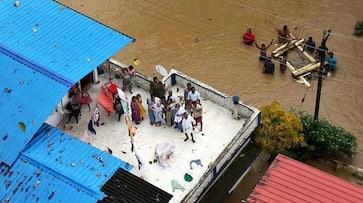The place known as God's Own Country saw the wrath of nature. Now, as the rain has finally receded and relief work is in full swing, the question still lingers: why Kerala?
Kerala floods has wreaked unimaginable havoc. Keeping everything aside, the first thing that needs to be done is rescue work and providing help to people to survive the adverse situation. Now, as the rain has finally receded and relief work is in full swing, the question still lingers: why Kerala?
The place known as God's Own Country saw the wrath of nature.
But there were some influential people, who had given the warning of such an occurrence nearly eight years ago.
We are not talking about predictions or astrology or the wrath of Gods. But the findings were based on the well-crafted study made by Madhav Gadgil Committee. In fact, two other committees were formed post that.
Speaking to media, the chairman of Gadgil Committee, Madhav Gadgil said that what happened in Kerala is a 'man-made calamity'.
The 10-member Gadgil committee known as the Western Ghats Ecology Expert Panel (WGEEP) was formed to do research on environmental issues and was appointed by the ministry of environment and forests of India.
After the study, the committee submitted a 522-page report ,which did not please the UDF government in power then.
The recommendations stated:
1) The entire Western Ghats (14,000 kms) should be divided into three zones as Ecologically Sensitive Area (ESA)
2) It classified 142 taluks in the Western Ghats into Ecologically Sensitive Zones (ESZ) 1, 2 and 3 - thus resulting in complete ban on quarrying, sand mining, thermal plants.
3) No new dams should be constructed in the ESZ areas, resulting in halting of the work on Athirapilly and Gundia dams (if the report was accepted)
4)Recommended decentralisation and more power to gram panchayats (local administration)
5) To form Western Ghats Ecology Authority (WGEA) under the ministry of environment and forests
These recommendations were not accepted by the government citing the reason that it was concentrating only on environment issues and that it was completely neglecting development.
Three major criticisms included:
1) Impractical as no mention of development
2) Sure no to WGEA. The State will not be able to control the forest land
3) No solution to revenue losses caused by banning of sand mining, quarrying and power plants
Interestingly, there was a section of lobbyists who scared the people living in Western Ghats area stating that their livelihood will be affected as they will be evacuated from that place.
This led to protest by people against the Gadgil committee which submitted its report on August 31, 2011.
So much so, the report was not even made public. Only after the Delhi court directed the authorities concerned, the report was published in the website of the environment ministry.
You can read the entire report submitted by Gadgil committee here:
Meanwhile, protests led to forming of another committee Kasturirangan Committee, led by scientist K Kasturirangan.
1) This committee was a mellowed down version of Gadgil committee with recommendations like 37% area be considered as ESZ while Gadgil committee recommended 60% of the land under this section.
2) One of its recommendations also stated that mining, quarrying and sand mining should be banned.
3) It brought 123 villages (against 142 of Gadgil committee) under ESA.
The report was submitted on April 15, 2013. But even this was not accepted by the government. Thanks to lobbyists, the protests continued and led to formation of another committee- (this time State-level) Oommen V Oommen Committee.
Even this committee had recommended cancellation of land acquisition proceedings as recommended by Kasturirangan committee.
Accordingly, this State-level panel also recommended that people living in the hill tracts will not be vacated and kept out of ESA.
All the while, forests were being converted into tea plantations. Trees were cut to make way for mining, quarrying and sand mining, affecting the ecological balance.
Recommendations of these committees never saw any implementation.
Last Updated Sep 9, 2018, 10:09 AM IST









![Salman Khan sets stage on fire for Anant Ambani, Radhika Merchant pre-wedding festivities [WATCH] ATG](https://static-gi.asianetnews.com/images/01hr1hh8y86gvb4kbqgnyhc0w0/whatsapp-image-2024-03-03-at-12-24-37-pm_100x60xt.jpg)
![Pregnant Deepika Padukone dances with Ranveer Singh at Anant Ambani, Radhika Merchant pre-wedding bash [WATCH] ATG](https://static-gi.asianetnews.com/images/01hr1ffyd3nzqzgm6ba0k87vr8/whatsapp-image-2024-03-03-at-11-45-35-am_100x60xt.jpg)


